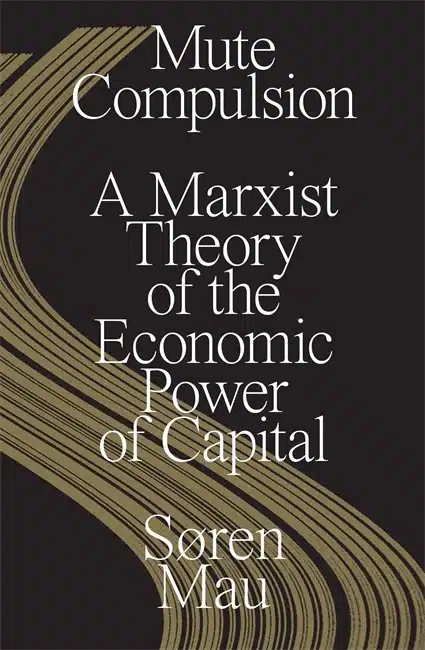

Mau develops a theory of what he dubs “economic power,” a form of power that has traditionally been overlooked by Marxist scholars, who have mostly focused on the role of violence and/or ideology. As Mau defines it, economic power differs from these because it does not act directly upon the subject; instead, he claims, it shapes subjects’ environment to force them to act in certain ways. As much as Mau considers violence and ideology to be important forms of power, he shows that theorizing economic power is indispensable to any serious understanding of how capitalism perpetuates itself through the process of social reproduction.
Mute Compulsion was originally published in German and Danish in 2021, then in English in 2023, and will now be published in Spanish at the end of this year. The book will be of interest to readers who are looking for an introduction to Marx’s key concepts, as well as for those who are already acquainted with his work. Mau recently sat down at the British Library with Hugo de Camps Mora to talk about the book and the extent to which its core concepts can inform anti-capitalist struggles today.
There are different things we can gain from carrying out an abstract analysis. From a methodological point of view, these theories can be helpful to produce concepts that can then be used to analyze concrete situations. From a political perspective, they can also be useful. When we criticize a specific variant of capitalism, located in a historical, geographical, cultural, or national context, defenders of capitalism will always say, “Well, this is just not the real or the right form of capitalism.” They can accept that there might be problems with a given form of capitalist society, but that capitalist society could be otherwise. What I try to do in the book is to show that the capitalist economy is always necessarily a system of domination, and that it is therefore always going to be anti-democratic. If you only criticize particular historical variants of capitalism, then it’s always possible for someone to come and say that the things you criticize are only an expression of that particular situation, and not of capitalism as such. By showing that domination is inherent to the core structure of capitalist society, it becomes possible to reject such a defense of capitalism.
Of course, there are also limits to such a kind of abstract analysis. Indeed, it only tells us something about capitalism in general, but capitalism never exists as such, that’s an analytical abstraction. Capitalism only exists in particular historical formations, and it is important to take this into account when thinking about things such as political strategy and tactics.
Violence is a form of power that functions by forcing bodies to act in a certain way, either directly or by threatening these with pain and ultimately death. Ideology is a form of power that works by influencing how people think in a broad sense, either consciously or unconsciously. Ideology has to do with the concepts, images, myths, and narratives that people employ to understand themselves and their surroundings. Economic power is different from violence or ideology in that it does not directly address the person involved. Instead, it shapes their environment so that they are forced to act in a certain way. Indeed, I think that there has been a tendency to focus a lot on the role of violence and ideology for the reproduction of capitalism. I consider these to be important and necessary forms of power that capitalism cannot exist without; yet I also think that it is important to consider economic power in order to understand how capital reproduces itself.
That might be a danger, yes, when continuing to use the concept. But nevertheless, I still think it’s possible to defend a Marxist concept of the economy. I do think it’s possible to describe certain social relations as economic relations, or to describe certain social processes as economic processes. What defines those relations and processes from a Marxist perspective is not that they are governed by a specific trans-historical economic rationality or anything like that. It’s rather the social function of those processes and relations and activities, which is that they constitute the basis of the continuing existence of society. The economy in a Marxist sense can be considered to be all of the processes that are necessary in order to reproduce society over time. And that cuts across the usual distinctions between what belongs to the economy and what does not belong to the economy. Because that would also include, for example, the reproductive labor that takes place outside the market-mediated economy. I would say that’s a non-economistic concept of the economy, since it does not rely on an idea of the economy as an ontologically separate and autonomous realm.
Proletarian basically just means propertyless, whereas worker seems to imply that you work. Often in the Marxist tradition, when speaking about workers, people implicitly think of wage laborers. I prefer to speak of proletarians because I am concerned with understanding the class domination that is necessary for capitalist society to exist. Capitalism presupposes the proletarianization not just of those whom capital needs as wage laborers, but also of all of the people capital needs as unpaid reproductive workers, as well as the people that capital needs as relative surplus population. I think that this re-assessment of the concept of class is also important for political reasons: it shows that class is not defined by one’s function in the system of production, but that it is more generally defined by one’s relationship to the conditions of social reproduction. Class struggle, then, cannot only be considered to take place at the point of production in a narrow sense; from this perspective, class struggle has to be understood as a way of resisting capital’s grip on life in all spheres of society.
Horizontal relations are the relations between units of production and market agents. They refer both to the relations between workers who sell their labor power and compete in the market, and also to the relations between individual capitalists who compete against each other. Horizontal relations are just as important and defining for capitalism as the specific form of class domination, the vertical relations. I think we miss an extremely crucial part of capitalism if we ignore those relations. One of the unique things about capitalism is that production on a general level is coordinated through the exchange of the products of labor in the form of commodities. The market thus has a historically unique role in capitalist society as a general coordinating mechanism of production. This situation means that everyone is subjected to market pressures. This is extremely important to understand how capital reproduces itself. Indeed, capitalism is a system of class domination, but it’s also a system of domination where the social totality, regardless of what class you belong to, is subjected to the mechanisms of mute compulsion––although it affects capitalists and workers in very different ways.
Yes. That’s a very important feature about the Marxist critique of capitalism; it’s not about a moral problem, it’s not a problem of greedy individuals. If that were the problem, then the solution would be some kind of moral education. Even if an individual capitalist is concerned about the environment and wants to pay the workers well and so on, they can only do so insofar as this doesn’t threaten their position in the market. Competition forces capitalists to act in certain ways––i.e., to prioritize profit over workers, over nature, and over everything else.
No, I don’t think capital has agency. Or put differently, I don’t think that it’s useful to broaden the concept of agency that much. I think it makes sense to think of capital as a social logic, as a way of using things, and also as an emergent property of social relations between human beings with agency. In my view, human beings act in a certain way, and social relations between them generate emergent properties. Indeed, capital is one among such emergent properties, yet that does not imply that it has agency.
That is an interesting and extremely difficult question. Throughout the history of capitalism, there has been a historically unique separation between production and reproduction––i.e., between the production of goods and all of the work necessary to reproduce labor power on a daily and on a generational basis. But there are also many examples of this reproductive labour being commoditized, and in that way transformed from something that happens outside the market-mediated economy to something that takes place inside of it, or socialized in the sense of being taken over by the state. So, of course, it’s interesting to ask whether or not it would be possible to commercialize or socialize all of the reproductive labor within capitalism. I don’t think that it’s really possible to give a conclusive answer to that question, but I tend to think that it wouldn’t be possible. I think that many parts of reproductive labour could in principle be turned into commodities or could be taken over by the state; but I do think that there will always be a remainder of reproductive labor that will not be integrated in the circuits of capital or transformed to the public service. If that’s true, it means that capitalism will necessarily imply a separation between production and reproduction, which also means that it will continue to rely on gender-based oppression.
Universal basic income can mean a lot of different things. As I see it, universal basic income can’t be the end goal because it would still be something that only makes sense in a market economy. One of the important results of my analysis in the book is that market socialism is not a possibility––it wouldn’t be socialism, it would still be capitalism. In my view, the abolition of capitalism requires the abolition of the market, which means that universal basic income can’t be an end-goal. However, I do think that in certain contexts, universal basic income could make sense as a strategy, as a way of radicalizing the struggle against capitalism.
When I say that we have to dissolve capitalism “at its roots,” what I mean is that we shouldn’t think of overthrowing capitalism as a process where we basically continue to produce in much the same way but then distribute the results in a more just manner. Instead, we should think of the struggle against capitalism as something that requires us to immediately begin to reproduce our daily lives in another way, because that’s the real basis of the power of capital. The power of capital is not something external to the economy; it’s built into it. As I have shown, the capitalist economy is necessarily a system of domination, so we need find new ways of organizing the reproduction of daily life.
It is to a large degree a continuation of Mute Compulsion, and especially of its more philosophical parts. I build on these and try to continue my analysis of Marx’s concept of the corporeal organization and the consequences of his analysis of human tool use. I think such an analysis has the potential to be turned into a kind of philosophical anthropology, which can tell us something about the corporeal roots of human historicity, human freedom and subjectivity. The perspective I develop has political consequences in the sense that it shows that we can never justify any particular politics with reference to human nature. Human nature doesn’t imply any kind of specific social form; it only implies the radical openness of human social reproduction, the radical underdetermined status of it.
